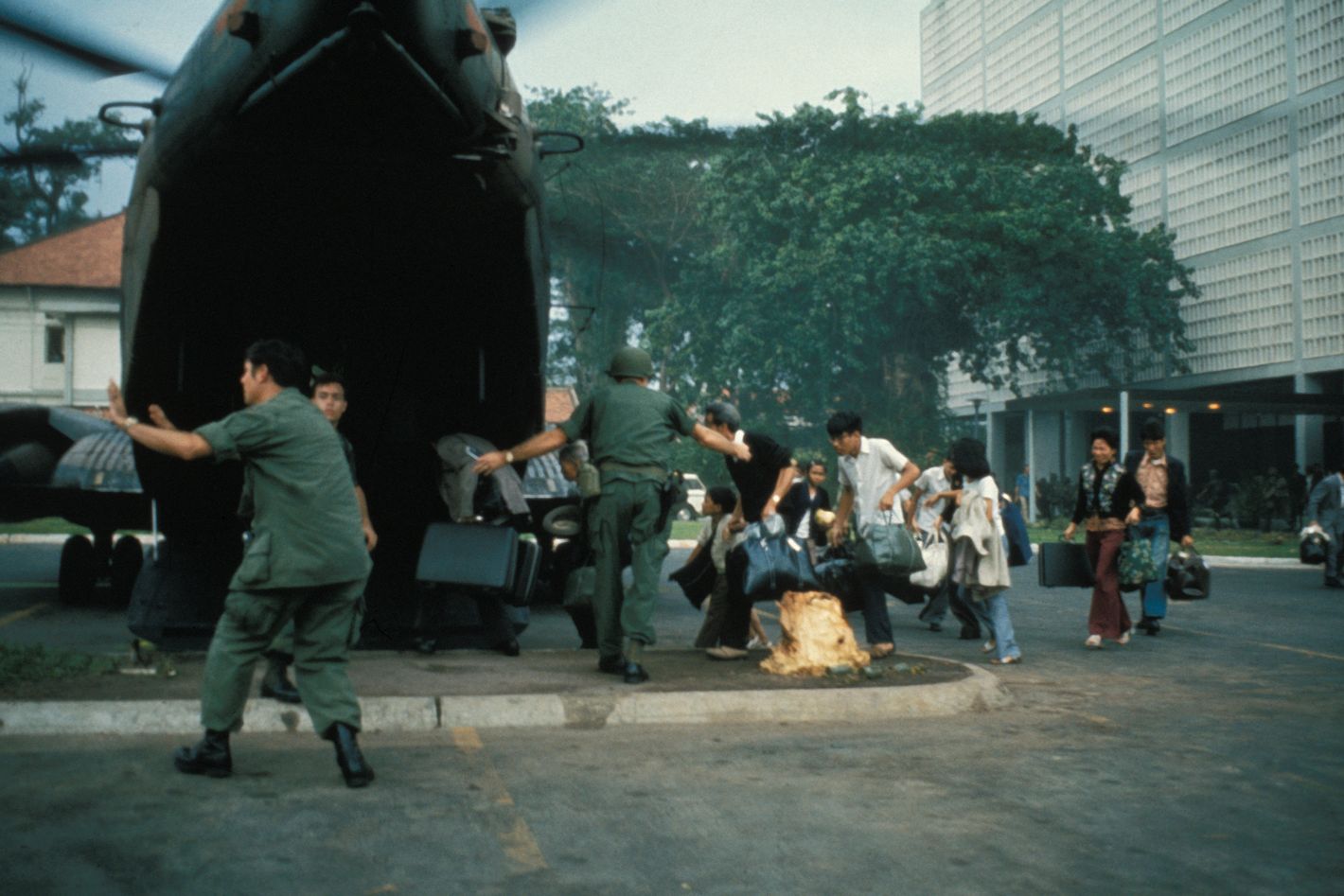Photo: Nik Wheeler/Corbis/Getty Images
One would think the Trump administration would want to draw attention to the terrible costs associated with America’s worst “forever war,” which ended 50 years ago with the Fall of Saigon and the evacuation of United States troops. Certainly, the human toll the Vietnam War took on our troops — or to use the now-mandatory Pete Hegseth terminology, our “warfighters” — would be worth remembering as clearly as possible. If, as appears to be the case in MAGA-land, the unnecessary death of 13 Americans during the botched 2021 withdrawal from Afghanistan was a crime that cries to Heaven for vengeance, then the roughly 22,000 Americans who died after the Tet Offensive eliminated any real chance of a U.S. military victory in Vietnam deserve some recognition as well. In addition, the long and by all accounts successful reconciliation between Vietnam and the U.S. will be a particular topic of 50th-anniversary ceremonies in Ho Chi Minh City on April 30, providing some solace for veterans and the families of the fallen alike. It’s not as though this war is in our distant past; about one-fourth of the current U.S. population was born before it ended.
But instead of honoring this solemn and important patriotic event, Trump’s diplomats are being told to stay far away from it, as the New York Times reports:
Four U.S. officials who insisted on anonymity to describe sensitive diplomatic decision-making said that Washington had recently directed senior diplomats — including Marc Knapper, the U.S. ambassador to Vietnam — to stay away from activities tied to the anniversary on April 30 …
Veterans returning to Vietnam have also been told they’re on their own, for public discussions they organize on war and reconciliation, and anniversary events. For many, it amounts to a sudden reversal after months of anticipation.
It’s a shame Vietnam vets who often felt abandoned or forgotten by their government will have to repeat that experience now, as the Times notes:
“I really don’t understand it,” said John Terzano, a founder of the Vietnam Veterans of America Foundation who served two tours in Vietnam and has attended anniversary events for decades. “As a person who has dedicated his life to reconciliation and marveled at how it’s grown over the last 20 years or so, this is really a missed opportunity.”
“It really doesn’t require anything of the United States to just stand there,” Mr. Terzano added, in an interview after landing in Hanoi. “This is all ceremonial stuff — that’s what makes it sound crazy and disappointing.”
That’s one way of putting it. Why is the Trump administration taking this strange hands-off position? If there’s any serious policy reason for ignoring an important historical moment and insulting both U.S. veterans and the Vietnamese (whose government is currently locked in intense tariff negotiations with both the U.S. and China), it hasn’t been disclosed. The most likely rationale the Times explores is more than a little disreputable:
April 30 is the 100th day of Mr. Trump’s second term. Some U.S. officials speculated that a Trump appointee or a State Department leader feared drawing attention away from that milestone with events that might highlight America’s defeat in a war that Mr. Trump managed to avoid.
In 1968, a year when 296,406 Americans were drafted into military service, Mr. Trump received a diagnosis of bone spurs in his heels that led to a medical exemption.
In any event, it’s not like this 50th anniversary sneaked up on anyone. Indeed, the Times notes, the ambassador who is being told to skip one of the most significant bilateral events since the guns fell silent was planning on participating very actively:
Mr. Knapper, the son of a Vietnam veteran who was sworn in as the U.S. ambassador in 2022, had embraced his diplomatic mission. As of a few weeks ago, he had been expected to attend the main anniversary events on April 29 and 30 alongside delegations from other countries, including Australia and the Netherlands.
He has often led ceremonies in which the United States gave artifacts from the war back to Vietnamese military families, and repatriated the remains of what were believed to be missing Americans.
In an essay for this month’s Foreign Service Journal, he wrote about traveling to Vietnam with his father and son in 2004, describing the trip as “a clear reminder of the sacrifices on both sides and the enduring importance of reconciliation.”
This abrupt walk-back isn’t the first whack the second Trump administration has taken against Vietnam War commemorations either; the DOGE demolition of USAID had an effect as well, as the Associated Press reported last month:
The Trump administration’s broad cuts to USAID also halted efforts to clear unexploded American munitions and landmines, a rehabilitation program for war victims, and work on a museum exhibit detailing U.S. efforts to remediate the damage of the Vietnam War.
In addition to exposing thousands of people to health hazards, the cuts risk jeopardizing hard-won diplomatic gains with Vietnam, whose strategic importance is growing as the U.S. looks for support in its efforts to counter an increasingly aggressive China.
Perhaps it’s as simple as a presidential determination to shut down remembrances of a military setback that he couldn’t blame on his immediate predecessor and past vanquisher. Whatever the reason, it should be articulated; otherwise, it’s just shameful.

